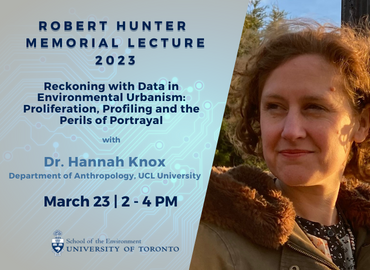Reckoning with Data in Environmental Urbanism: Proliferation, Profiling and the Perils of Portrayal
When and Where
Speakers
Description
This talk explores the use of digital data as a tool of environmental urbanism. Building on work which has shown how digital technologies have profoundly shaped practices of urban governance and control, Dr. Knox questions what happens when existing repositories of environmentally relevant data become newly mobilised as a tool of urban transformation in the face of the climate emergency. The paper takes as its focus a citizen-oriented initiative called Oldham Energy Futures, which has sought to enfold climate and energy data into a social-justice informed attempt at urban transformation. Using data as an invitation for citizens to engage with and participate in infrastructural and environmental dynamics which would otherwise remain out of view, data here reveals itself as a powerful way of re-mapping places and the socio-material relations through which they are sustained. As data enables places to become newly profiled and configured, place is refigured from a bounded context for urban intervention, to a site of ambivalence, history, complexity and (dis)empowerment. This opens up new trajectories for change, whilst also posing difficult questions about the possibilities and limits of participation in urban life.
About the speaker:
Hannah Knox is Professor of Anthropology at University College London. Her work traverses the study of infrastructure, materiality, politics, environment and technology and in recent years has focused largely on the role of anthropology in the face of global climate change. Her books include Roads: An Anthropology of Infrastructure and Expertise (with Penny Harvey, Cornell 2015), Ethnography for a Data-Saturated World (with Dawn Nafus, Manchester University Press 2017) and her most recent monograph Thinking like a Climate: Governing a City in Times of Environmental change (Duke 2020). She is currently researching energy transitions in the UK, with a particular focus on the role of digital media, sensors and data in reformulating people’s understanding of what energy is and what it could be.



